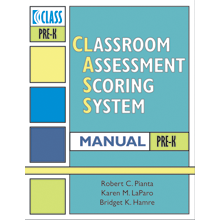I recently heard about a great analogy about the CLASS tool and I had to share it. I can’t take credit for the idea. Affiliate Trainer, Teresa Bockes, originated the concept, and I loved it the minute I heard it: CLASS is like a house. Let’s build a house step-by-step to learn more about this metaphor.
Topics: Pre-K, Trainer Tips Read MoreCLASS Is Like a House
CLASS is More than Open-Ended Questions
Do you find that when you train teachers or coaches on CLASS, all they want to talk about is open-ended questions? When trainees hear CLASS tool, often the first thought that comes to their mind is asking children open-ended questions. And while asking “how” and “why” questions is extremely important in helping to foster and support language and concept development, we cannot have effective interactions with these questions alone. There is so much more to the CLASS tool!
Topics: Pre-K, K-12, Infant and Toddler Read MoreWe often hear people asking about conducting CLASS observations during mealtimes. What kinds of interactions can be observed while children are just eating? Turns out—there are many examples of high-quality interactions during breakfast or lunch. Let's focus first on the Emotional Support CLASS domain.
Topics: Pre-K, K-12, Infant and Toddler Read MoreThe Scoring Summary Sheet can offer observers and coaches a lot of insight on what's happening in a classroom during a typical day. Located on page 18 of the Pre-K CLASS Manual, Figure 2.2 shows how to create a summary of all six observational cycles. It also allows coaches to ask data-backed, specific questions like, "What's happening during small group that may be affecting a teacher's behavior management interactions?"
Topics: Pre-K Read MoreWe recently received an email from an observer who had just completed his K-3 recertification and had some difficulty with Teacher Sensitivity. He stated that he was uncertain how to code the indicator of Addresses Problems if the students do not appear to have difficulties. He wondered if he needed to be more attentive to minor signs of awareness and responsiveness. If you've ever wondered that yourself or have had a trainee ask you that question, read on to see our response.
Topics: Pre-K, K-12 Read More




